Launching a mobile app doesn’t always go according to your plan. You’ll hit some bumps and bruises along the way.
It’s even possible that your app was a complete failure. This is a disheartening reality for some people, but you’re not alone.
In fact, 30% of mobile applications fail within 12 to 18 months of their launch. Furthermore, technology projects as a whole tend to run over budget by 45% and underdeliver by 56% in terms of projected value.
More than 60% of apps on the Google Play Store see an 80% decline in downloads after their first week of launching.
Here’s something else to consider. The majority of smartphone users don’t even download one app per month.
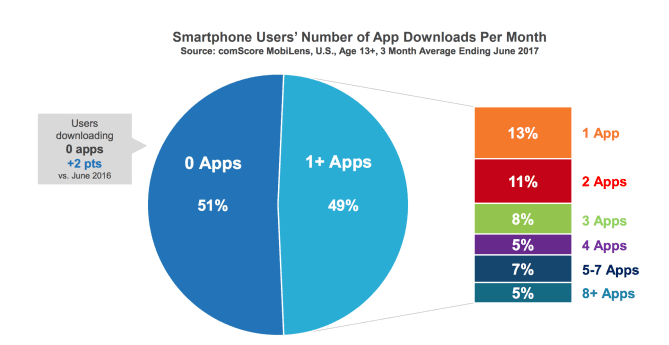
This makes it extremely difficult to be successful in this industry if you aren’t taking the proper steps in your planning, development, launch, and maintenance stages.
Let me be clear. I’m not telling you all of this information to discourage you. I’m actually trying to do the complete opposite.
I know that it hurts, but you shouldn’t feel ashamed that your app failed. It happens to more people than you probably realize.
So you made some mistakes. Rather than feeling sorry for yourself, it’s important that you learn from them.
When you take this approach, all of the time and money that was spent ends up being valuable rather than being a waste.
I know lots of people who have launched failed apps. They were able to bounce back and become successful.
That’s why I came up with this guide. I want to teach you how to do the same.
Here’s what you need to know if you want to turn your mobile app failure into a success story.
Back off a bit
When you’re too deep into a project that didn’t work, it can be crushing. I know how long it takes to build an app.
You’ve been putting in long hours every day for at least six months before your app even launched.
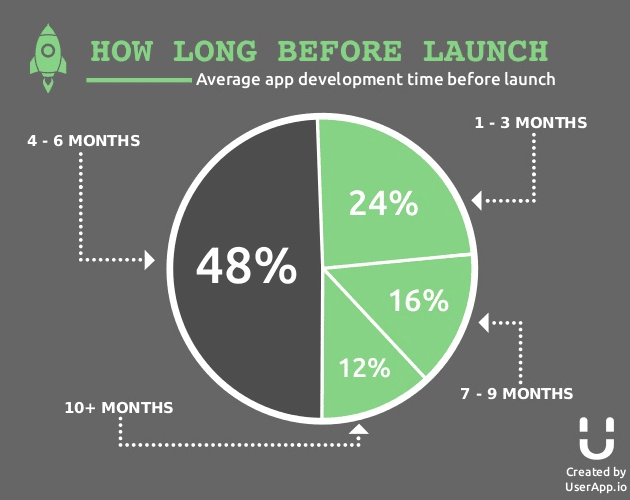
If your app failed further down the road, then you may have even been at this for over a year.
When you spend so much time working it can cause you to burnout. These burnouts can easily creep into your personal life and affect your relationships with your friends and family.
At the end of the day, those relationships are more important than your app development project. So take some time to repair any damage that you may have caused.
Take a breath and relax.
I know this can be difficult, especially if you don’t have a steady income stream right now. But it’s important to take a step back so that you can find your focus.
That way when you decide to come back you’ll be renewed and refreshed.
It may sound crazy, but take a vacation if you have the means to do so. Some time away to relax and enjoy the sun and the beach can really help clear your mind.
This isn’t running away from your problems. It’s just a way to keep your mental health sharp. You’re going to lose your mind if you never take a vacation.
As an entrepreneur, you have so much of your day on a tight schedule. But you need to schedule time for your personal life as well.
Make an effort to be home and eat dinner with your family. Plan specific time frames during your day to unplug and stop responding to calls, texts, and emails.
Part of the reason that your app failed could be because you were too close to the situation at all times that you were blind to what was going wrong.
But now that you have some time to look back, you can re-evaluate things.
Look at yourself honestly
Here’s something else that you need to do to turn around your app failure into a success. Take a good long look in the mirror.
It’s easy to blame others for your problems. But you need to honestly ask yourself one question.
Did you cause the failure? Or was it an unavoidable external force that caused it?
Take a look at the top reasons why startups fail.
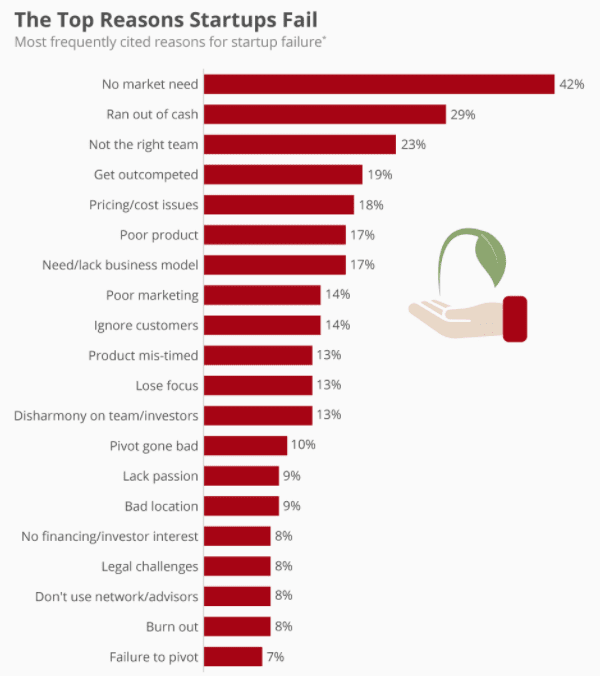
For the most part, the majority of these circumstances could have been avoided. For example, let’s just take a look at the top three reasons on this list.
- No market need
- Ran out of cash
- Not the right team
If you spent time and money building an app that there wasn’t a market for, then you didn’t do your research.
Did you run out of money during the development process? That’s caused by poor budgeting.
Your team wasn’t good? Well, who assembled the team? You hired everyone.
I’m not trying to sound harsh here. But sometimes the best thing for you to do is be a little bit hard on yourself. If you’re the reason why your app failed, you need to accept that.
Don’t blame other people for what you’ve done. Instead, look at the circumstances that caused the failure so you can fix it.
If you’re having trouble with this step, you should consider learning the principles of emotional intelligence. It’s a concept that is thoroughly discussed by Daniel Goleman, who published books on the topic.
There are four main components of emotional intelligence (EQ).
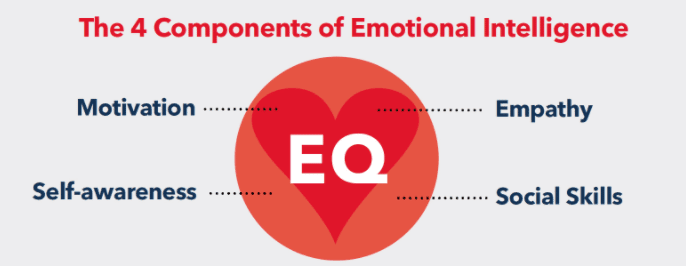
Self-awareness helps you control your moods and makes you think before speaking or acting. It also helps you recognize how your actions have an impact on the people around you.
Your motivation is what you’re passionate about. These are reasons that encompass much more than just money or social status.
You need to be empathetic to understand how to treat people based on their own emotions.
Social skills refers back to what we discussed earlier about finding a balance between your work and personal life. It’s about building, managing, and maintaining relationships.
Take the emotional intelligence test. It will give you a breakdown of certain elements that you need to improve on.
This can really help you when you’re trying to look at yourself honestly in the mirror.
Stay humble but don’t lose confidence
Failure is a humbling experience.
It can be hard to find the balance between humility and confidence. But when it comes to learning from your app failures, this is a critical step.
You’re not the first person to fail at something. In fact, you might have had other failures in life as well.
You were able to bounce back from those failures in the past, so this time shouldn’t be any different.
Big people have been fired from big companies. CEOs have even been fired from companies that they started and built from scratch.
The key is to remember that life is long. If you’re smart, dedicated, and focused, failure is just a success that you’ll learn a hard lesson from. I’ll discuss this in greater detail shortly.
But for now, you need to start to look at the positives to keep your confidence. You’re still standing and in one piece. You’ve got your family, your health, and you’re surrounded by people who care about you.
You made some mistakes, so what? Not a big deal. Your failure will only crush your confidence if you allow it to.
What positives can you take away from this experience?
For starters, you got your feet wet in the mobile app development space. I’m willing to bet you know a lot more right now than you did a year or two ago about building apps.
You might have even learned how to code or design an app.
Earlier I showed you some staggering statistics about how common failure is for mobile apps and startup companies.
Well now, I want to give you some encouraging news.
Was this mobile app your first attempt at launching a startup company? If so, you’ll have a greater chance of success the next time around.
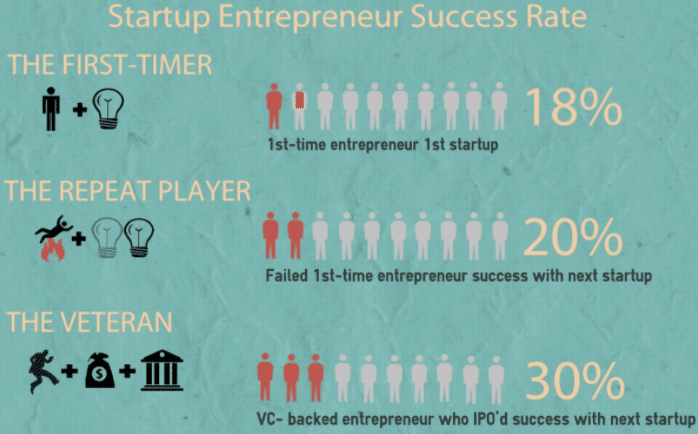
Entrepreneurship is like anything else. Practice makes perfect.
The more hours you have under your belt doing something, the easier it’s going to be for you. There will be less of a learning curve the next time you build your app.
That means you’ll be able to focus on improvements and avoiding mistakes as opposed to learning new skills.
Learn your lessons
You’ve failed. We’ve already established that.
But now it’s time to pinpoint what exactly went wrong.
Was it something that happened during the development stages? If you don’t test your app properly while you’re building it, then it’s going to have lots of bugs and glitches.
Problems like this hinder the user experience. People just won’t use an app that constantly crashes or has errors.
In fact, only 16% of users will try to load a failing app more than twice. If this is the reason that your app failed, then it could have easily been avoided.
There’s no reason why you need to rush your launch. I’m not saying that it should take forever to build, but proper testing is critical.
You can even implement continuous integration to reduce glitches and make your app run smoother.
Maybe your app didn’t have any glitches. The performance was fine, but nobody knew about it.
Did you wait until your app launched to start promoting it? If so, that’s a big mistake.
For those of you that already have an existing business, you should have been telling your current customers about your app before it was released.
If you launched your app as a startup company, you need to put in extra effort to build hype and make a name for yourself. That way consumers will know who you are when your app gets released.
Even if you were able to get some initial downloads, what were you doing to retain those users?
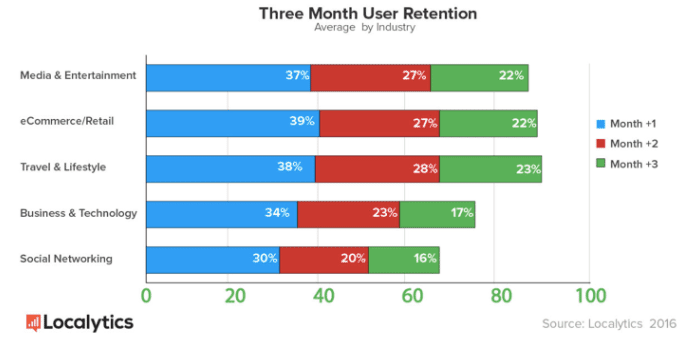
As you can see from the graph, retention rates decrease each month, regardless of what type of app you have.
The apps that succeed find a way to keep their users coming back for more instead of abandoning the app.
This all stems back to your initial market research, assuming you conducted it.
Once you recharge your mind, take a look back at your previous mobile app strategy. Analyze your final product.
Where did it go wrong?
And if you didn’t have a roadmap that outlined your strategy, then there’s another problem right there.
Learn from those mistakes.
Start over
It’s time to go back to the drawing board.
I know that starting from scratch can seem like an uphill climb. It won’t be easy, but you can do it.
You’re rested, focused, confident, and you learned your lessons.
Now apply everything you learned to your new app. This new app could be a remastered version of your failed attempt, or it may be something completely different.
It all depends on what you discover during your pre-development and market research stages.
Just make sure that you don’t make the same mistakes that caused your failure the first time around.
Plus, you’ve got a higher chance of succeeding after your first failure.
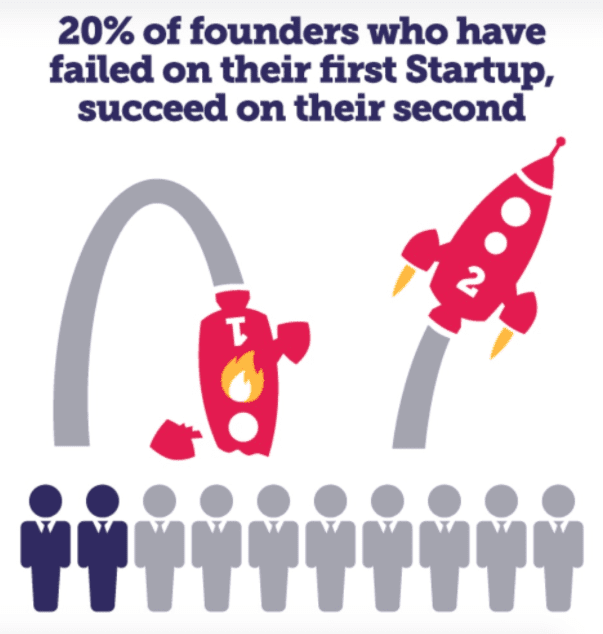
There are always new opportunities out there.
You were able to come up with an idea in the past, so you can do it again this time.
Starting over doesn’t necessarily mean that you have to start completely from scratch. During your last attempt, you may have made some relationships with people who are experts in the field.
If your app performed well, but you failed to market it correctly, there’s no reason that you can’t work with the same developers.
This will help speed up the process since you don’t have to spend time finding the right people again.
The possibilities are endless. Now that you’re armed with a fresh outlook, you can do anything!
Conclusion
Failure hurts, but don’t hang your head. A failed app shouldn’t define who you are and prevent you from having success in the future.
There are certain steps that you need to follow if you want to get back on track.
Take a step back. Look at yourself honestly and figure out if you were the reason why the app failed. Don’t blame others for your mistakes.
This humbling experience shouldn’t kill your confidence.
Learn from your mistakes and apply these lessons when you move forward and start over.
You might even fail again. That’s OK. Just try to remember these tips.
Apply them again during your self-evaluation and you’ll be alright.
If you need some help building your app, then you can always talk to a BuildFire representative for some guidance in the right direction.
How will you turn your failed mobile app into a success?